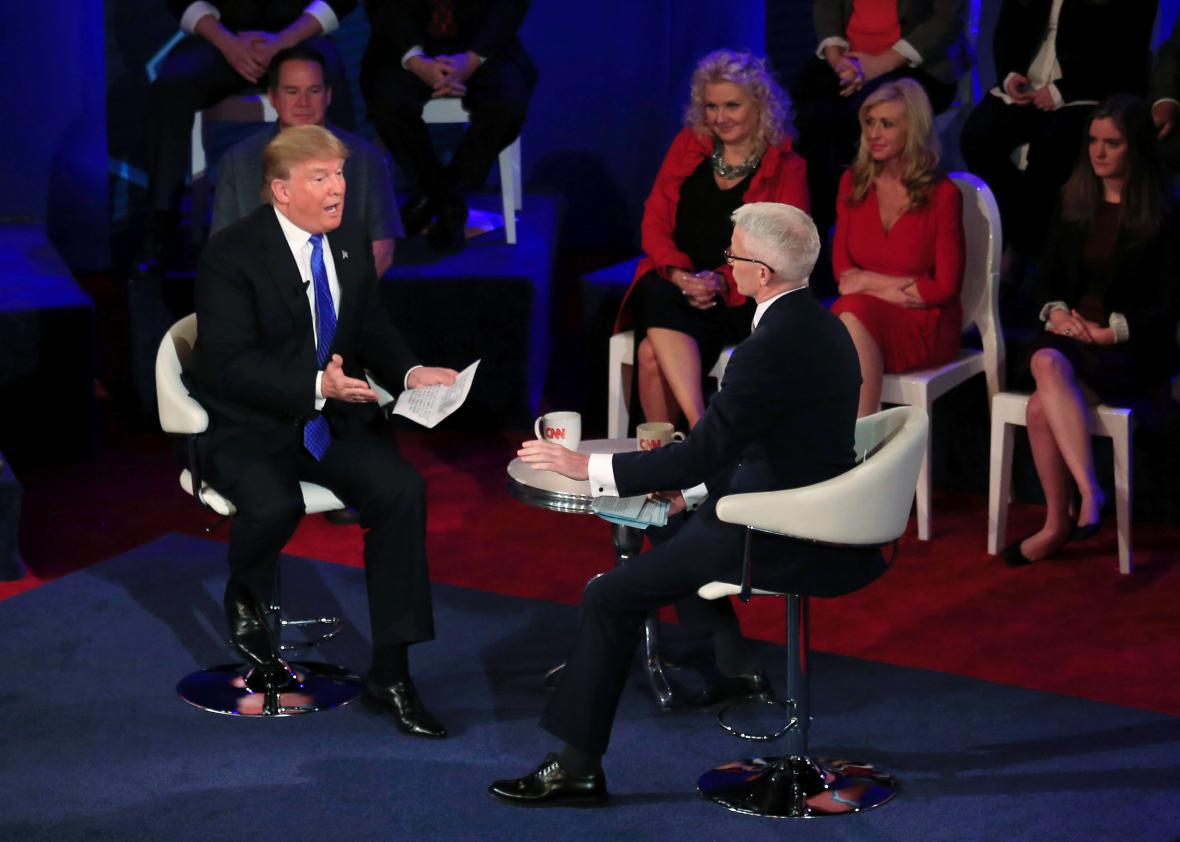“My greatest failing is sometimes I don’t follow up,” Anderson Cooper said during CNN’s town hall in Milwaukee on Tuesday night, a week before the state’s primary. Cooper was jokily alluding to an earlier question from an audience member who had asked Ted Cruz about the candidate’s biggest weakness. But Cooper’s coverage of the 2016 GOP primary has indeed been a fine example of not following up, one of many journalistic sins that he and his network have committed in their pursuit of Donald Trump and the ratings he brings.
But Tuesday night was different: Cooper found—it would be too generous to say recovered—his footing, and the network delivered a pretty solid event. After months of softball interviews, Cooper went after Ted Cruz and (especially) Donald Trump with forensic skill. In response, Trump flailed and crumbled, the bigot and misogynist in him laid bare. Will it matter? Probably not. But at the very least, at a moment when his colleagues in the political media have been fitted for hair shirts over their alleged enabling of Trump, Cooper was able to elicit from the Republican front-runner his most disastrous performance of the campaign.
Cooper started by asking Cruz, the first interviewee, about the battery charge filed against Trump’s campaign manager, Corey Lewandowski. Cooper bird-dogged Cruz on the subject of his obscene proposal to “patrol” Muslim neighborhoods. And Cooper didn’t let Cruz off the hook for the hypocrisy of his anti-Trump stance, pointing out that Cruz did nothing but cozy up to Trump for months. When the audience took over the questioning, Cooper kept interrupting Cruz’s filibustering, noting that the Texas senator had called for the “carpet-bombing” of ISIS and trying to pin him down on an answer about whether he wanted ground troops to fight the extremist group.
Trump came out second, and Cooper began by challenging him about his campaign’s shifting story on Lewandowski. Cooper could have badgered him a little more thoroughly—Trump’s people initially said that nothing had happened at all, only later settling on the story that the reporter had actually posed a threat to Trump(!)—but Cooper was able to coax from the candidate an honest portrayal of a dishonest bully. Trump seemed surprisingly ill at ease, sputtering and interrupting Cooper.
Cooper then turned to Trump’s retweet of an unflattering photo of Ted Cruz’s wife. When Trump responded that “he started it,” referring to Cruz, Cooper shot back that this was a 5-year-old’s answer.
Trump seemed taken aback by the ferocity of Cooper’s questioning, changing his story uncomfortably. Trump was also asked by an audience member about stigmatizing minority groups after terrorist attacks. When Trump ignored the question (going off about Iraq, among other things), Cooper pressed him, something he did with the other candidates as well. (There were exceptions to the good questions: One Trump supporter more or less asked the candidate to talk about how rich he was.)
Who knows why Cooper changed his tune Tuesday night, but he was sharp and pointed and on his game. Asked by an audience member for the three most important functions of the federal government, Trump cited education. Cooper pounced, asking how that fit with Trump’s previous condemnation of Common Core. Cooper also pressed Trump several times on something he has so far received a free ride on: his constant claim that he funds his own campaign, despite having a large “donate” button on the campaign’s website.
The endless commentary in recent days about the amount of blame the press should shoulder for Trump’s rise has tended to focus too much on the media’s impact and less on its proper, adversarial role. Cooper’s fine performance Tuesday night may not be a sign that anything is going to change, nor is it likely to bring down or even dent Trump’s campaign. But Cooper did his job well, and he did it irascibly, and Trump’s awful performance was more likely a consequence than a coincidence.
